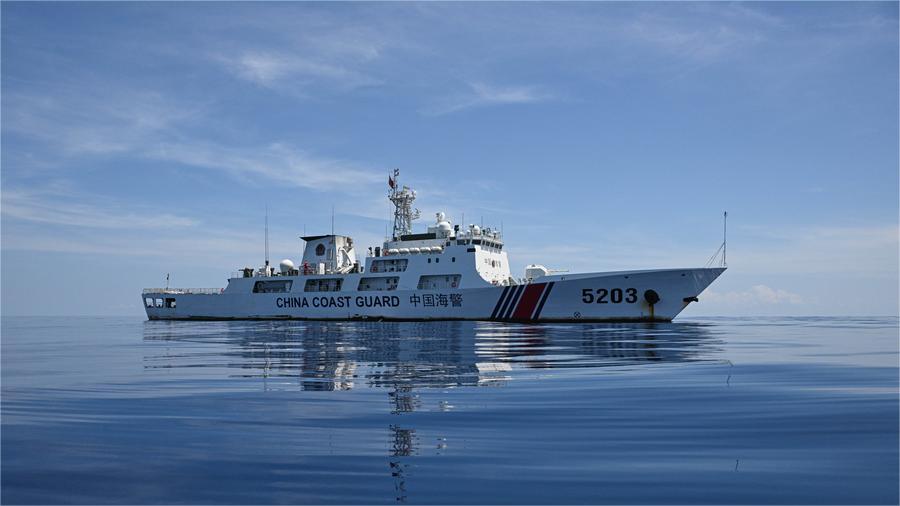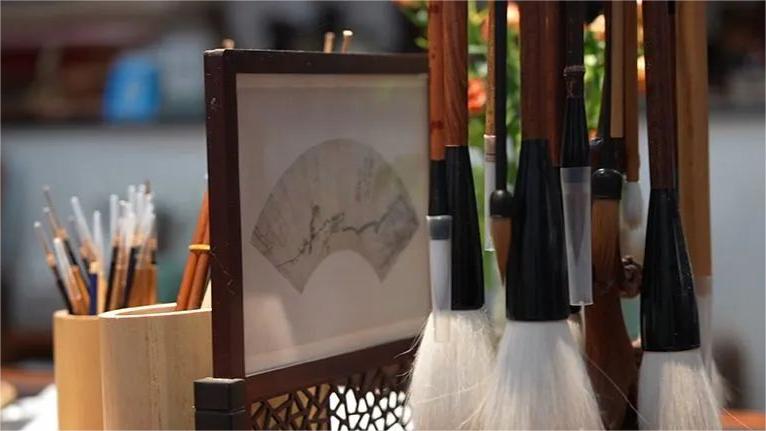China makes big strides in new energy vehicle development with innovation
On May 14, Leapmotor International, a joint venture established by Leapmotor, a Chinese maker of electric vehicles, and Stellantis, a multinational auto company headquartered in Amsterdam, the Netherlands, began operation. Four months later, two pure electric models of Leapmotor will be exported to nine European countries including France, Italy and Germany.
On May 20, German carmaker Audi and Chinese car manufacturer SAIC Motor announced to jointly develop a new platform for intelligent and electric vehicles.
The increasing international cooperation exactly mirrors China's leading position in the development of new energy vehicles (NEVs) worldwide.
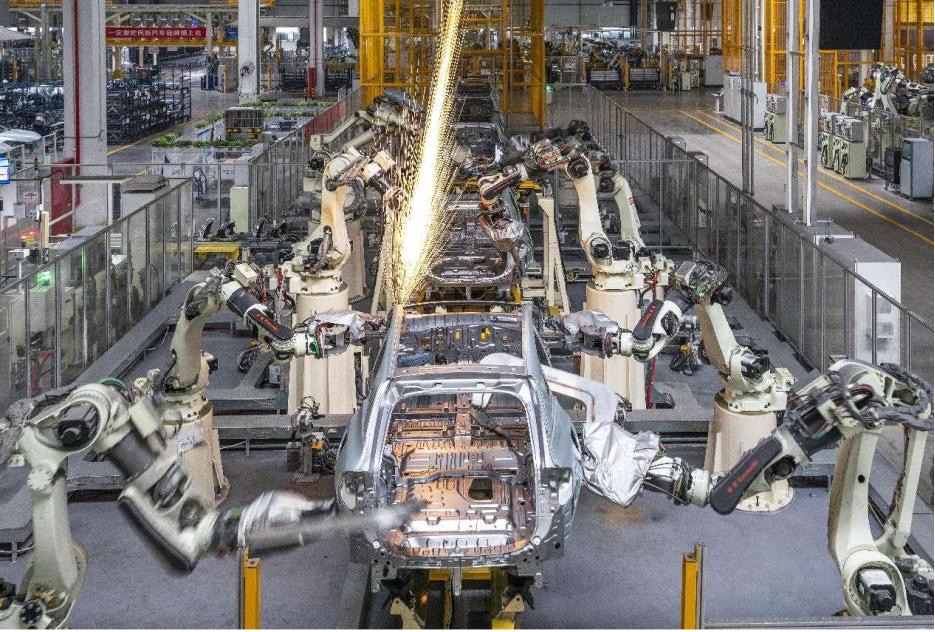
New energy vehicles (NEVs) are welded by robotic arms in a factory in Nanjing, east China's Jiangsu province. (Photo by Zhu Hongsheng/People's Daily Online)
In recent years, the Chinese automotive industry, striving to manufacture electrified, intelligent, and connected products, has been actively promoting innovation in technologies, products, and business models.
In 2023, China's sales of NEVs exceeded 9.49 million units, nearly 126 times compared to 2014 and accounting for over 60 percent of the global market share, ranking first globally for nine consecutive years. The proportion of NEVs in China's annual sales of automobiles has increased to 31.6 percent.
However, 10 years ago, the global NEV industry was still an emerging sector heavily reliant on charging infrastructure and had yet to achieve commercialization. Numerous obstacles stood in the way of its progress, such as underdeveloped technologies, potential safety concerns regarding batteries, high production costs, poor user experience, and an untapped market.
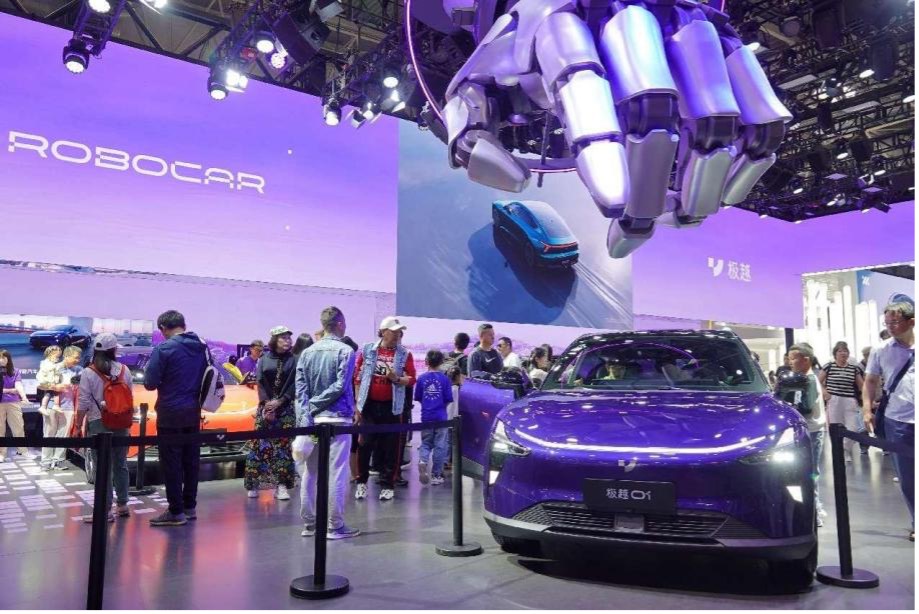
Jiyue 01, a model launched by Jidu Auto, a joint venture between Chinese carmaker Geely and tech giant Baidu, is exhibited at the 2024 Beijing International Automotive Exhibition, May 3, 2024. (Photo by Tang Ke/People's Daily Online)
Fu Bingfeng, executive vice president and secretary-general of the China Association of Automobile Manufacturers (CAAM), attributed the huge achievements of the Chinese NEV industry to the country's forward-looking and highly practical industrial policies, and its strategic efforts to advance future-oriented charging infrastructure.
He said that the technological innovation made by the industry and relevant enterprises as well as the vast Chinese market also contributed significantly to such achievements.
In the past decade, China has introduced over 70 policies and measures to bolster its NEV industry. It has established a complete and coordinated industrial system, fostered the world's largest market for NEV consumption, and built a favorable environment in which the NEV sector and relevant industries mutually reinforce each other through win-win cooperation.
Wei Yeguo, who lives in Xinglong township, Wanning, south China's Hainan province, bought a pure electric vehicle produced by Chinese NEV giant BYD last September.
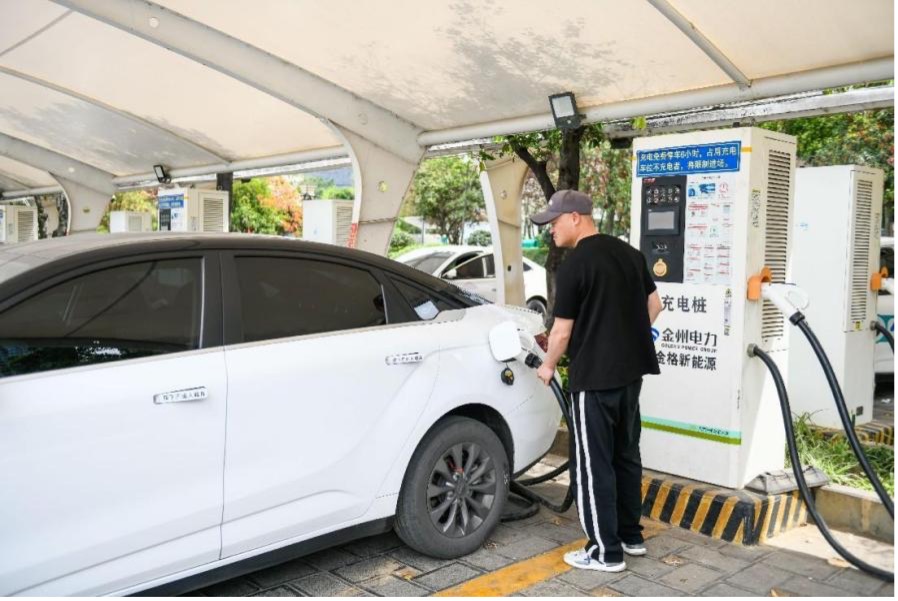
A man charges his vehicle in Xingyi, southwest China's Guizhou province. (Photo by Liu Zhaofu/People's Daily Online)
"We have installed a charging pole at home, which makes charging incredibly affordable. Over the past six months, I have saved at least 10,000 yuan compared to driving a fuel-powered car," Wei told People's Daily.
If favorable policies were what propelled NEV sales in the early stage of the industry development, then the increasingly convenient and diversified charging modes and low charging costs have become the market catalysts sustaining the rapid and continued growth of China's NEV industry after the phase-out of subsidies in 2023.
China has built the world's largest and most extensive-coverage charging infrastructure network. As of the end of 2023, the number of NEV charging facilities in China has grown 65 percent year on year, reaching almost 8.6 million.
Besides, China has witnessed continuous extension of industrial chains in power battery recycling and reuse, cascade utilization, and material regeneration. More than 10,000 power battery recycling service outlets have been built across the country, making local recycling possible.
Recently, a Chinese extended-range vehicle drove 2,141.4 kilometers from Wuhu, southeast China's Anhui province, to Guangzhou, capital of south China's Guangdong Province, without recharging or refueling during a livestream event, which attracted massive attention.
Notably, the vehicle, manufactured by Exeed, the premium brand of Chinese automaker Chery Automobile Co., Ltd., completed the challenge in 42.5 hours with a full load.
Huang Zhaogen, assistant general manager of Chery, said the challenge set a new record for the maximum range achieved by Chinese NEVs, thanks to Chery's technological innovation.
To alleviate the range anxiety of users and make charging more convenient, Chinese NEV companies have kept developing new technologies and business models, and upgrading their core technologies. Besides, they have made progress in intelligent connected vehicle technologies.
For example, Jidu Auto, a joint venture between Chinese carmaker Geely and tech giant Baidu, launched its first artificial intelligence-powered electric vehicle called Jiyue 01 last year. The model is equipped with Baidu's integrated AI system Ernie Bot, a large language model. At the 2024 Beijing International Automotive Exhibition, Geely exhibited the world's first AI digital chassis.
According to statistics, 56.2 percent of passenger vehicles sold in China in the first quarter of 2024 were equipped with Level 2 or above driver assistance systems. Besides, 81.5 percent of the vehicles came with navigation systems and 87.9 percent had voice control systems.
Intelligent factories, fully-connected 5G factories, and green factories are springing up across China. Empowered by digital technologies, China's NEVs are of better quality, making new strides in high-end, intelligent, and green development.
"In the first four months of this year, China's NEV production and sales reached 2.985 million and 2.94 million units respectively, a year-on-year growth of 30.3 percent and 32.3 percent," Fu told People's Daily.
The CAAM predicted that the production and sales of NEVs in China will make new records and exceed 10 million units this year, Fu added.
Photos
Related Stories
- China's new FuXi AI weather model eyes maritime transportation, new energy sector
- New energy revitalizes coal mining subsidence area
- AI Vibes: Development of China's new energy industry conforms to market economy laws
- NYT: West learns from China's successes on new energy
- Chinese cities launch auto trade-in programs to invigorate consumption, offering boost for new-energy vehicle sector
- China's new energy boom turbocharges global green transition
- Popularity of China's new energy products not due to subsidies: spokesperson
- China's new energy industry provides world with high-quality production capacity
- China's new energy sector full of dynamism
- China's new energy sector a catalyst for job creation globally
Copyright © 2024 People's Daily Online. All Rights Reserved.






